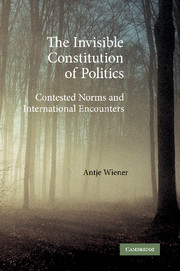Book contents
8 - Comparative assessment and working hypothesis
Published online by Cambridge University Press: 22 September 2009
Summary
The validity claimed for propositions and norms ‘transcends spaces and times’; but in each case the claim ‘is raised here and now, in a specific context, and accepted or rejected with concrete implications for social interaction’.
(Dallmayr 2001: 341; my emphasis)Introduction
This chapter turns to the comparative assessment of the data obtained through empirical research and interview evaluation. To that end, it discusses the findings of the seven opposition-deriving exercises and the set of attitude questions revealed in the previous three case study chapters. The intention of this final assessment is to generate a working hypothesis for future research. Taken together, the findings demonstrate a notably distinctive outcome with regard to patterns of convergence, divergence or diffusion. Both type A divergence (domestic vs transnationally derived meanings) and type B divergence (domestic vs domestically derived meanings) are recurring. By contrast, type C divergence was not a notable pattern. This finding indicates that, contrary to the literature which would expect enhanced harmonisation or Europeanisation, the convergence of associative connotations regarding the three sets of fundamental norms under investigation could not be confirmed. Convergence was found with reference to single domestic elite samples only. This pattern suggests that, notably, converging interpretations do not seem to depend on nationality but on contextualised social practices instead.
This conclusion has to be read with caution, to be sure. After all, the comparison involved a limited sample of four elite groups and fifty-three interviews only. Nonetheless, it does provide a valuable basis for generating a research hypothesis.
- Type
- Chapter
- Information
- The Invisible Constitution of PoliticsContested Norms and International Encounters, pp. 183 - 196Publisher: Cambridge University PressPrint publication year: 2008

